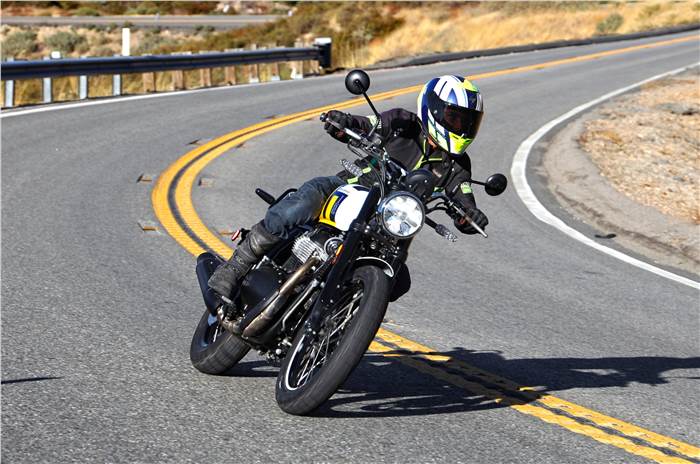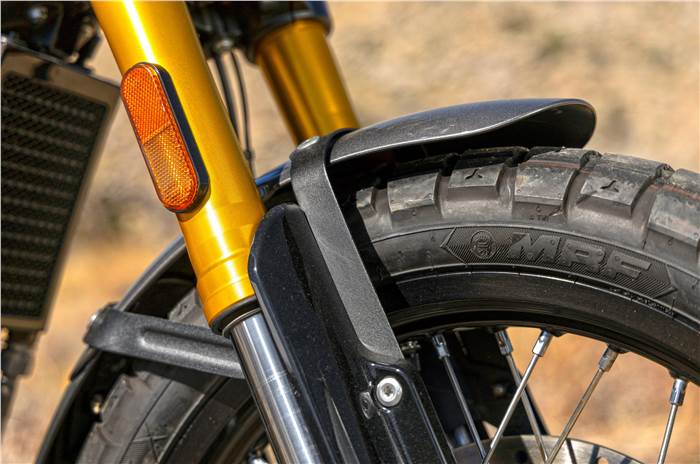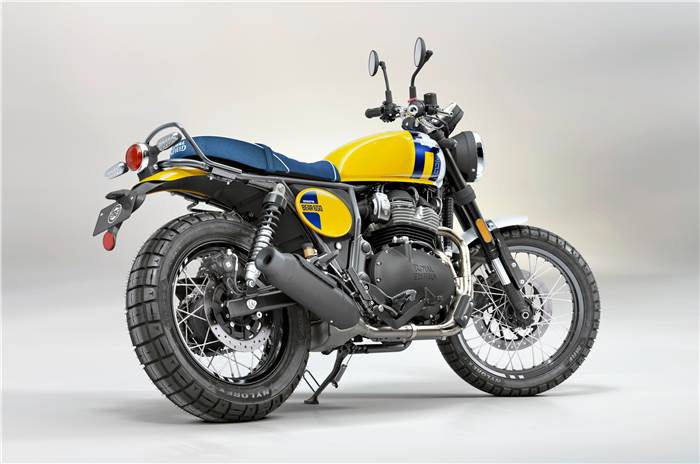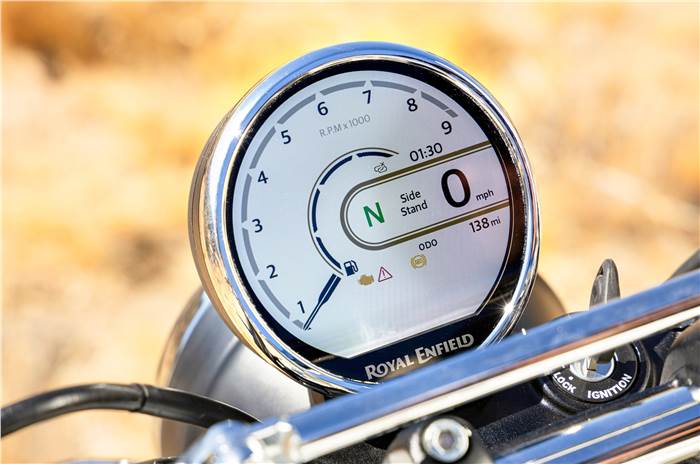RE’s latest 650cc twin is much more than just a scrambler-ised Interceptor.
It’s hard not to get carried away when riding on mountain roads in Southern California. Maybe it’s the crisp, cool high-altitude air that tricks you into feeling relaxed, even when the speeds are anything but. We certainly got carried away in the twisties during our first ride aboard the new Royal Enfield Bear 650, and it wasn’t entirely to do with that cool mountain air. Confused? Understandable. After all, why should a scrambler-ised version of the already hefty and not very sharp Interceptor be egging us on in the corners? Well, as it turns out, the Bear is much more than just a scrambler-ised Interceptor.
Royal Enfield Bear 650: design, features
Sure, many of the changes have been made with the intent of making the Bear better suited to off-roading. You’ve now got an upside-down fork (in place of the Interceptor’s conventional unit) offering more travel – up from 110mm to 130mm. It’s a similar story at the rear, too; the Bear sticks with a twin shock setup, but travel has grown from 88mm to 115mm. As a result, seat height and ground clearance have also increased, and now stand at 830mm and 184mm, respectively.
But to accommodate the new suspension components and adapt the bike to its more off-road-focused role, Royal Enfield has had to strengthen the frame in multiple areas. It’s the same basic frame as the Interceptor, but it has now been braced in various areas to add strength and stiffness, and the sub-frame has been revised as well. The end result is a chassis that feels noticeably stiffer than the Interceptor’s. Attacking corners hard, the Bear does feels hinged in the middle, and the sort of mid-corner bumps that would have the Interceptor wobbling and wallowing all over the place are simply shrugged off.

There’s great feedback and you really have the confidence to keep carrying more speed into a corner, and leaning further and further, despite the more off-road centric 19in/17in wheel on offer. This is also, in no small part, down to the excellent new tyres wrapped around those wheels – you’re unlikely to have heard of the MRF Nylorex tyres before and that’s because they’re a new dual-purpose model that have been developed specifically for this motorcycle. Despite the blocky pattern, the grip, profile and predictably on the road were superb, and there were no complaints when on tarmac.

Part of the Bear’s playfulness in the twisties can also be attributed to the suspension setup. The front fork strikes a nice balance between comfort and performance, but the shocks feel rather firm and unforgiving. This was the case across riders of different weights, even at the minimum preload setting. On the largely excellent Californian tarmac, it wasn’t a deal-breaker, but the firm edge could be felt, and rough patches translated to my backside without sufficient mitigation. How this setup fares on the less than perfect roads back home is something we’ll have to find out in due course.
Royal Enfield Bear 650: performance, ergonomics
Many of the numbers are bigger with the new Bear, and while most of that is good, one big number that’s got some people a little apprehensive is the seat height. Yes, 830mm is definitely on the taller side – I’m not very tall, only 5’8”, which means I can’t flat-foot both feet. That said, it isn’t unmanageable either, and with a little bit of forward planning, you can comfortably pick either one side to flat-foot. It also helps that the footpegs are now a little further forward, so they don’t foul your shins as much.
The other change to the riding position is the handlebar, which is wider and a little further away from you. The wider part is nice, it gives you more leverage over the bike, which I like. The further away part, I’m not such a fan of – it’s a bit more of a forward reach than I’d like, and if you’re short like me, then this could become a point of fatigue over long rides.

On the upside, this is now a lighter motorcycle than the model it’s based on. Moving to this new 2-into-1 exhaust setup has helped shed a bunch of weight, though some of that has been added back through the suspension and the frame strengthening. Nevertheless, it is still 2kg lighter than the Interceptor. However, at 216kg, still a fairly hefty motorcycle. You only really feel this at low speeds and when paddling about, and once you’re on the move, the Bear masks its weight rather well. The new exhaust has done more than just trimming the weight – it’s also allowed RE to squeeze out some more torque from the motor; it now produces 56.5Nm vs the 52Nm we’ve seen from it so far.
So the engine feels a little more punchy now, while still remaining the pleasant, fairly refined, characterful motor that we’ve fallen in love with over the last 6 years. The new exhaust has slightly changed the sound, though. It exits a little closer to you and doesn’t run quite as far back as the twin-pipe designs, which is one of the factors at play. Overall, it’s a little more braap-y and raspy, as opposed to the more sweet-sounding twin pipe 650s. I think this suits the character of the Bear rather well.
Royal Enfield Bear 650: off-road performance
Now, we come to the big question of off-road performance. We didn’t have a great deal of opportunity to ride the Bear off-road – we only got a short spin up and down a fairly simple gravel track. But the feeling is that this is definitely more of a soft-roader than a hardcore off-roader. The suspension can absorb some hits, up to a point, and these new tyres seem to work well off-road.
The rear ABS can also be turned off. So yes, you can have some fun off-road. But the weight makes its presence felt, and the ergos are halfway between on-road and off-road, so this is not a bike you’d want to push very hard when the tarmac runs out. But you won’t have to turn around either.

Turning off that rear ABS is done through a fully-digital TFT display – this is the first Royal Enfield 650 to get one, and it’s the same unit you’ll find on the Himalayan. Which means, you also get features like Bluetooth connectivity and Google Maps integration. It’s also the first RE 650 to get full-LED lighting. The only other noteworthy feature is a USB charging port, but as is the case with all REs now, there is a comprehensive list of accessories that covers the usual suspects, like touring mirrors and a touring seat, as well as more scrambler-specific items like a sump guard and a headlight grille.
Royal Enfield Bear 650: Verdict
The final piece of the puzzle is the price – and starting at Rs 3.39 lakh (ex-showroom, Chennai) and going up to Rs 3.59 lakh (ex-showroom, Chennai), the Bear sits between the Interceptor and GT on one end and the Shotgun and Super Meteor on the other. Having ridden it around California, it feels like the most versatile and competent RE 650 today. It can cruise, it can tour, it can commute, you can corner pretty hard – it’s a great road bike – and it’s got some off-road ability as well. But how much of a pain the firm suspension setup will be back home in India is something we’ll only be able to tell you a little further down the road. Test rides and deliveries begin on November 10, so it shouldn’t be too long before we find out.
Also See: Royal Enfield Bear 650 video review